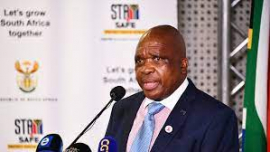
Health Minister Dr Joe Phaahla says his department has allocated R7.2 billion over three years for the direct transfer - based on approved plans - to facilities in need of maintenance, refurbishment, upgrades, replacements or new infrastructure.
The Minister delivered the department's 2023/24 budget speech in Parliament on Tuesday, where he detailed challenges facing the sector and plans aimed at improving health services.
“Our budget vote takes place at a time when our country’s economy is not doing well following the COVID-19 pandemic, and now load shedding. The financing of public health is seriously negatively affected by this situation,” Phaahla said.
The department’s budget allocation, the Minister said, shows a decline of R4.4 billion, from R64.5 billion in 2022/23 to R60.1 billion in 2023/24.
Phaahla said National Treasury has acknowledged that the health sector is underfunded by a minimum of R11 billion.
“Even though the R4.4 billion decline can be attributed to the discontinuation of conditional grants that were allocated for the fight against COVID-19, including vaccination, the fact of the matter is that there is not even inflation adjustment and there are also reductions in allocations to existing programmes.”
According to the Minister, 89.2% of the budget is transferred to provinces and in the current budget, the transfers and subsidies to provinces are at R56.2 billion (of the total R60.1 billion).
Meanwhile, the Minister said R10 million per year, over the next two years, will go to the no-fault scheme to cover adverse events following COVID-19 vaccination.
Infrastructure
In the 2023/24 financial year, Phaahla said more than 200 primary health care (PHC) facilities are expected to attain “ideal status”, bringing the number to 2 400 facilities.
The tertiary services' R14 billion grant, which is used as a subsidy for highly specialised medical services, will take care of the 31 tertiary and central hospitals, mostly in urban areas.
“We currently have just under 50 000 community health workers (CHW) in service and we are aware that ideally, we need more.
“Our HR team is working through the Public Health and Social Development Sectoral Bargaining Council to find a lasting solution for long-term or permanent engagement of CHWs,” the Minister said.
Human resources
Over the last 10 years, Phaahla said the training of doctors by local medical schools and in Cuba has improved.
He said medical interns increased from 500 in 2015 to 2 625 in 2022, while medical community service practitioners increased from 1 322 to 2 369 over the same period.
“The problem is that provinces have sometimes not been able to absorb the medical officers due to budget constraints.
“We are working with South African Medical Association Trade Union (SAMATU) to make sure that doctors, who want to work in the public sector, are assisted to get posts.”
Phaahla said the South African Nursing Council (SANC) and the Council on Higher Education (CHE) are finalising an agreement on the articulation of previous diplomas into higher education to qualify for postgraduate studies.
NHI
Under the National Health Insurance (NHI) grants, the department has set aside R1.4 billion, which will be implemented on agreed projects from PHC to tertiary services.
Phaahla told MPs that government is committed to the reform the current health system, which mirrors the inequality and inequity of economic and social systems.
“We are committed to the progressive realisation of Section 27 of our Constitution. We believe that the current two-tier system, one system for the rich and one for the poor, is unsustainable. We also believe that health should be a common good and not for profit, especially at the point of service.
“The NHI bill, which is currently in your hands, is simply an instrument for the realisation of the goal of equity.” – SAnews.gov.za


